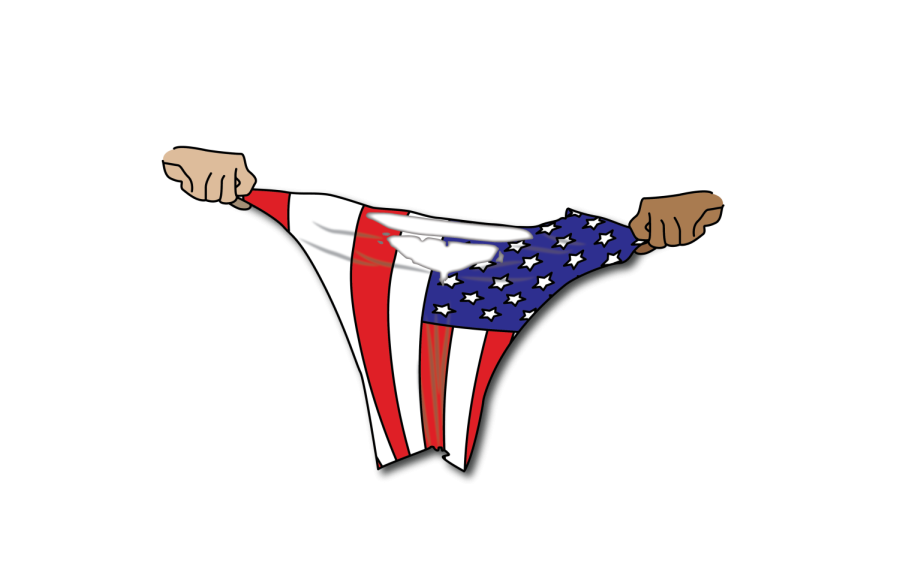The word “nationalism” invokes a wide variety of connotations in American media, from events like The American Revolution and Manifest Destiny to even World War II. The common thread that holds these types of nationalist moments together is a sense of unity among the American people, actively working towards a common purpose to better the country.
However, this year’s midterm elections have dozens of candidates running whose platforms promote their own new idea of nationalism: conspiracy theories, anti-semitism and white nationalism. Some of these candidates are directly affiliated with groups like the Proud Boys, known for dressing up in tactical vests and hosting violent street rallies intended to create fear against their opposition.
This is the concerning new type of nationalism rapidly emerging in America: extremist groups stopping at nothing to achieve an agenda they believe is best for the country, even at the cost of hurting or killing innocent bystanders. These extreme groups reflect the broader state of American politics as the partisan and identity divides become stronger.
Beliefs like these are no longer uncommon. Last year on January 6th, the United States Capitol was attacked by multiple different nationalist groups trying to stop the U.S. Congressional session from verifying the results of the 2020 presidential election Electoral College vote. According to CNN and The New York Times, over 110 US Capitol Police officers were injured, four crowd members and five police officers died as a result of the attack and two additional officers later died from committing suicide.
In order to stop this possibility from becoming a reality, the United States needs to unify and reevaluate what it truly means to be an American by identifying our common interests, not our polarizing differences.
The history of the word “nationalism” has led to confusion with the seemingly similar but distinct word “patriotism.” Unlike modern nationalism, patriotism often leads Americans to feel united rather than divided. AP United States History and former civics teacher Michael Hopkins said that 9/11 unified our country for a brief moment, allowing us to remember why we are proud of our country and to honor sacrifices that were made to protect it.
The traditional definition of nationalism is working towards a goal to better one’s country or affiliated group. While patriotism has to refer to a country or nation, it does not always apply to a physical country. Nationalism also applies to groups of people connected by common origin, ethnicity, ideology, or cultural ties.
But new types of nationalism have been corrupted by extremist groups and are no longer fitting this definition. The main perpetrators of these new forms of inflammatory nationalism are white nationalist groups such as the Ku Klux Klan, Proud Boys and various neo-Nazi organizations. These groups work towards their goals of spreading white supremacism and the idea of the inferiority of any type of minority in America.
These groups also seek to grow their influence by recruiting, especially targeting teenagers online. White nationalist groups are now promoting themselves via social media posts on popular teen platforms like TikTok and Instagram, using both discreet hashtags to hide from censorship and targeted hashtags to appeal to a young audience. These posts pose a danger to teenagers who may not fully understand what they are signing up for, allowing them to get lured in by manipulative memes and content.
The way that these groups promote these ideologies is through fear-based campaigns. They use anything to push their points across, from baseless threats such as impending terrorist attacks by minorities to “radical” teachers brainwashing their students. For nationalist groups, the important part of this tactic is to highlight the feeling of being attacked on some level so that people will want to come together and stop whatever “threat” they have proposed.
“The sense of being under attack seems to really elevate feelings of nationalism,” Hopkins said.
This explanation of high stress leading to more unity in groups of people may seem counterintuitive, but studies in psychology verify the phenomenon. According to Scientific American, feelings of stress and anxiety can lead to higher levels of socialization among people we are familiar or comfortable with due to the human desire for social connection.
But when feelings of stress are accompanied by the desire to control, it leaves people wanting to push away from the greater “society” and retreat into other groups that share the same controlling desire as them.
The desire to control rather than work together during a time of crisis is exactly what is plaguing American politics and nationalism right now. This phenomenon explains why divisions and tensions between political parties are at an all-time high. With political leaders feeling both stress and the need to control, they form their own isolated groups that are not willing to work with the other side because of their self-inflicted isolation.
Today especially, presidential nominees often spend much of their time arguing why their opponent is worse than them instead of why their platform is more beneficial to America, effectively becoming a display of character attacks. They have even gone so far as to influence their followers to act in the same manner against people of the opposite party, calling for a strict divide by any means necessary, even storming the Capitol Building.
“When you have an idea that’s nihilistic in the sense that you’re willing to do anything to achieve power, then [you will] go and activate nationalist groups,” AP US Government and Politics teacher Brandon Burmeister said.
In order to stop these extreme groups from opposing a united American country, we need to stop promoting hate against specific racial and ethnic groups. Instead, we need to unite all Americans into doing what is best for our country. While not all issues are going to be agreed upon in our two-party system, politicians still need to focus more on unifying supporters who believe in their campaign and less on the negative qualities of their opponent. With these changes, we can redefine nationalism into a positive concept used for the improvement of our country.
“People of all different backgrounds, ultimately at the end of the day, have much more in common than they have disagreements,” Burmeister said. “Even though we might disagree on the issues at stake, there’s a fundamental understanding that everybody loved America, and I think that’s what we have to rediscover.”











